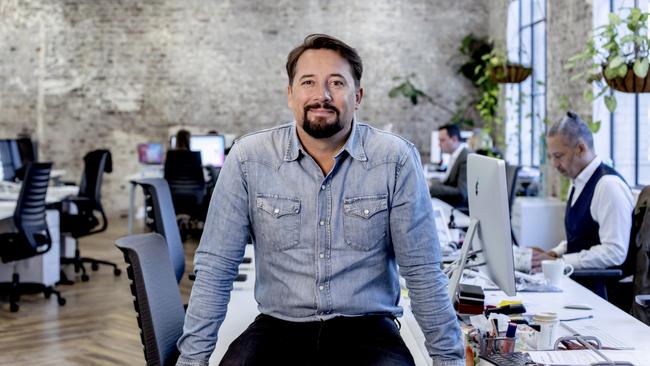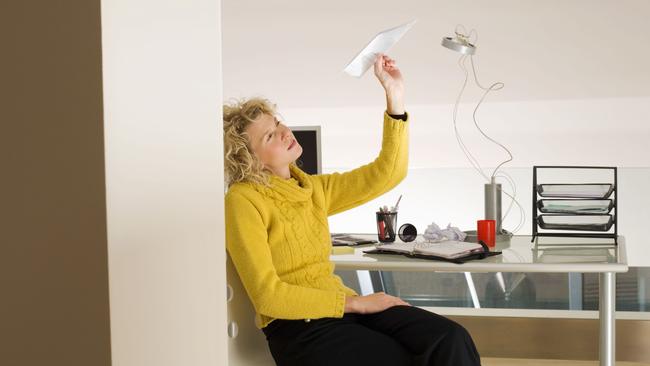What employees can do when the boss monitors and spies on them at work
Employers have more tools than ever to keep track of and even spy on staff. Here’s what you can do about it.

SmartDaily
Don't miss out on the headlines from SmartDaily. Followed categories will be added to My News.
Working from home is the norm now for many of us but it triggers the inevitable concern: is your boss spying on you and what can you do to protect yourself?
In a data-driven technological world, many workers still are surprised to learn their boss has been monitoring their every move and exactly how they are doing it.
From GPS monitoring of blue collar workers to monitoring typed keystrokes, employers have a host of surveillance tools they can legally use.
Surveillance has increased in the past year as employers scramble to keep a virtual eye on staff.
Research by The Australia Institute finds 70 per cent of workers say their workplace uses one or more methods of digital surveillance, while 10 per cent are unsure.
Most workers agree they should be notified when any surveillance is used.
So what’s the best way to cope?
WHAT EMPLOYERS CAN MONITOR AND WHY
If the employer owns the device, workers should assume it is under surveillance.
In industries such as construction, logistics, transport, horticulture and healthcare, GPS location data is recorded when equipment is used.
The Australia Institute’s Centre for Responsible Technology director Peter Lewis says many systems are designed for work management reasons and workers may not be allowed to turn them off.
“If it was that easy, it wouldn’t be such a problem,” he says.
“If it’s part of an employment contract, or the terms of your employment – (for example) if you’re an uber driver, you can’t turn off the app.
“We don’t have clear articulated guide rules and lines in place and we really need them.
“At the moment, all the power lays in the hands of the employers.

The Centre has made a submission to a NSW inquiry into the future of work, arguing information gathered through workplace monitoring and surveillance should be treated as a work output and covered by workplace laws and regulations.
It also wants a rethink of the control and use of data produced in the workplace, including for it to be included in calculating productivity gains in wage negotiations.
It is not always a trust issue.
Many employers use the data to make future business decisions, such as how to automate tasks.
“It’s not just to monitor your presence but to start to figure out how automation can do the work you do,” Lewis says.
“It’s entering a lot of information about how they can spend their time.”
HOW TO PROTECT YOURSELF
The golden rule is that a work computer should be used only to produce work content.
“That may mean you need to invest in a personal device,” says @WORKSPACES founder Jenny Folley.
Also avoid saving personal files, whether photos of children or bank statements, on a work computer or cloud-based file servers such as OneDrive or Google Drive.
“Forget the boss, do you really want the IT team scrolling through your personal documents?” she says.
“Anything saved on to your work computer is, rightfully or wrongfully, fair game to anyone with access to your device.”
It includes saving passwords to personal accounts.
Also take care not to gossip about your boss or co-workers, or whingeing about meetings to colleagues on chat messages.
“Using keyboard-tracking technology, your boss will know what you have sent before even the desired recipient of the message,” Folley says.
Folley recommends workers ask their employer what type of tracking is being undertaken, and how this is being managed.
“Agree on what you feel is appropriate,” she says.
Many organisations are installing software to ensure workers’ productivity is on target.
Some take screenshots, so only visit non-work-related sites on designated work breaks, if at all.
Other software accesses webcams, so ensure your home workstation’s background is professional or bare of personal items.
Even if workers do not mind access to certain personal details, consider the ramifications if that data is wiped or stolen.

WHAT ABOUT HACKING?
Companies increasingly are being compromised, while many workers lose personal photos and access to accounts when they leave their job.
We Are Unity chief executive and founder Ben Bars says during the pandemic, managers admitted to monitoring video conferencing use, employee emails and slack conversations in order to gain a sense of their staff’s productivity.
Its Future Ways of Working report reveals more data is required to track performance and keep employees accountable.
“This highlights the need for data transparency, if remote working is here to stay,” he says.
“A mutual understanding must be reached between employees and employers around what is being monitored, coupled with accurate tools to measure productivity, ensuring workplace relationships in a remote environment are built around trust and transparency.”
The report recommends employers clearly articulate how it will help employees if they opt in, and to never gather data for data’s sake.
Originally published as What employees can do when the boss monitors and spies on them at work




